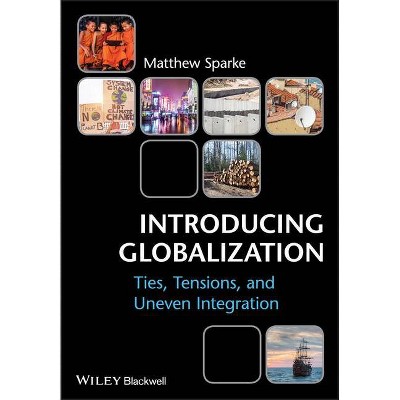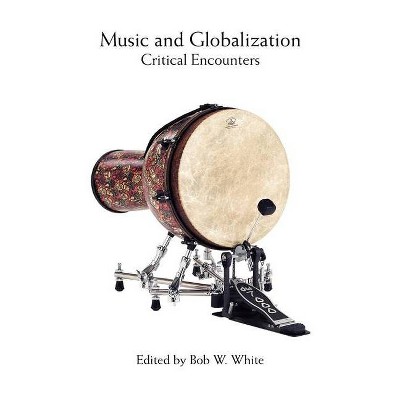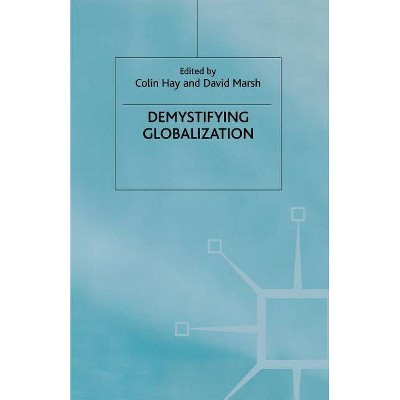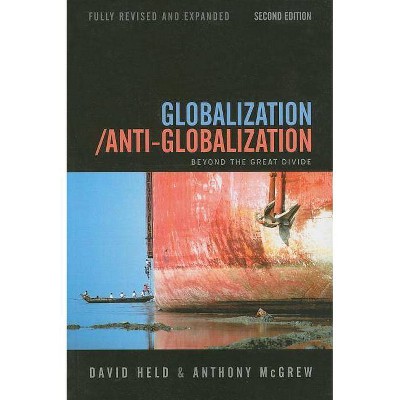Introducing Globalization - by Matthew Sparke (Paperback)

Similar Products
Products of same category from the store
AllProduct info
<p/><br></br><p><b> About the Book </b></p></br></br>"Introducing Globalization is a major textbook on globalization designed specifically for introductory courses, actively encouraging students to engage with the topic and develop informed opinions about controversial debates"--<p/><br></br><p><b> Book Synopsis </b></p></br></br><p>Designed specifically for introductory globalization courses, <i>Introducing Globalization</i> helps students to develop informed opinions about globalization, inviting them to become participants rather than just passive learners.</p> <ul> <li>Identifies and explores the major economic, political and social ties that comprise contemporary global interdependency</li> <li>Examines a broad sweep of topics, from the rise of transnational corporations and global commodity chains, to global health challenges and policies, to issues of worker solidarity and global labor markets, through to emerging forms of global mobility by both business elites and their critics</li> <li>Written by an award-winning teacher, and enhanced throughout by numerous empirical examples, maps, tables, an extended bibliography, glossary of key terms, and suggestions for further reading and student research</li> <li>Supported by additional web resources - available upon publication at www.wiley.com/go/sparke - including hot links to news reports, examples of globalization and other illustrative sites, and archived examples of student projects</li> </ul> <p>Engage with fellow readers of <i>Introducing Globalization</i> on the book's Facebook page at www.facebook.com/IntroducingGlobalization, or learn more about this topic by enrolling in the free Coursera course Globalization and You at www.coursera.org/course/globalization</p><p/><br></br><p><b> From the Back Cover </b></p></br></br><p>"Matthew Sparke's wonderful book sets a new standard in studies of globalization. With extraordinary perspicacity, Sparke maps the inequalities wrought by globalization, the complex forms of interconnectivity at play, and the politically-motivated discourses that surround "globalization". It is a compelling read, rich in insight, beautifully crafted - a magisterial overview for students and scholars alike."</br> <b><i>Craig Jeffrey, University of Oxford</i></b> <p>"Finally, a globalization text that takes its subject seriously yet simultaneously explores the myths that surround it. Matt Sparke relates the two 'levels' or ways of thinking about globalization as a material phenomenon and as a political project. This not only makes for a refreshingly novel take on globalization, one that other introductory books manifestly fail to achieve as they go one way or the other ... it does so in an accessible manner."</br> <b><i>John Agnew, University of California, Los Angeles</i></b> <p>"This text is written by an extremely well qualified geographer who has experienced globalization in all its multi-faceted dimensions and has taught generations of his students about its inherent tensions and divisions. Its coverage is extensive and yet detailed; its well-researched content constantly challenges us to think critically about globalization; and its end-of-chapter exercises are great fun to work with. These are all the hallmarks of a superb text. I recommend it wholeheartedly!"</br> <b><i>Henry Yeung, National University of Singapore</i></b> <p>"Written with passion, lucidity, and rigor, [this is a] rare text, making accessible to a generation of globally-oriented students the complex and urgent debates about globalization and the empirical and analytical research that can inform such debates."</br> <b><i>Ananya Roy, University of California, Berkeley</i></b> <p>Interdisciplinary, accessible, and comprehensive, this broad guide identifies and explores the major economic, political and social ties that comprise contemporary global interdependency. At the same time, it is designed to help students understand the way in which the word "Globalization" - and the struggles over its meaning - lies at the heart of debates between advocates of a "free market" and what critics describe as the damage and devastation of "market fundamentalism" and "neoliberalism." <p>Topics explored in detail include the rise of transnational corporations and global commodity chains; the development of global labor markets and worker solidarity; the recent global financial crisis; transnational law and legal advocacy; the increasing influence of market forces over governance, both locally and globally; the development of global cities and the emergence of other new spaces mediated by market relations; global health challenges and policies; and emerging forms of global mobility and organization by both business elites and their critics. Enhanced throughout by numerous empirical examples, maps, tables, and other illustrations, the book includes a glossary of key terms, and suggestions for further reading and student research. Additional resources are available at <b>www.wiley.com/go/sparke</b> for readers looking to explore topics further. <p>Written by an award-winning teacher, Introducing Globalization outlines the empirical evidence about interdependency in detail and with historical sensitivity. It helps students to develop informed opinions about globalization, inviting them to become participants rather than just passive learners.<p/><br></br><p><b> Review Quotes </b></p></br></br><br><br /><br /> <p>"A comprehensive overview of the topic of globalization... it is clearly written and provides a good framework for students...a fine contribution to the emerging body of scholarship that seeks to weigh the arguments about globalization's spatiality." <i>AAG Review of Books</i></p> <p><br /><br />"Sparke models inquiry into taken-for-granted concepts or events through rich understanding and questioning. More importantly, he reframes spatial theory as the starting point of social studies conversations about globalization. Rather than accept the inevitability of globalization, he depicts the inevitability of inequity. He examines how inequities become actualized in lives through geopolitical and geoeconomic infrastructure. He encourages us to reconsider the relationships between disciplines, contending that disciplined inquiry enables simplistic understanding. He allows geography and spatial theory to be a way of understanding the world, a lens that resonates across the social studies. The book importantly segments a variety of explanatory moments to allow readers without a strong economics background to understand economic principles. It is a lack of economic understanding that makes global policy discussions unintelligible to the general public. In the process, he ultimately constructs the globally minded citizen. While his brand of global thinking (and citizenship) has a problematic Western perspective, it also utilizes a critical lens that requires awareness of these contradictions and their implications for ourselves and others. The spatial thinking highlighted throughout this review relies on thinking across the disciplines to attend to how, where, and why places are constructed independently and interdependently across scales and time. Rather than assuming that places are knowable, rejecting the three myths encourages questions about what has been made invisible, how new places come to exist, the kinds of interactions that occur therein, and how they reify and amend cultural and other discourses." (<i>Theory & Research in Social Education</i>, 19 February 2015)</p><br><p/><br></br><p><b> About the Author </b></p></br></br><p><b>Matthew Sparke</b> is Professor of Geography and International Studies at the University of Washington, where he also serves as the Director of the undergraduate program in Global Health.
Price History
Price Archive shows prices from various stores, lets you see history and find the cheapest. There is no actual sale on the website. For all support, inquiry and suggestion messagescommunication@pricearchive.us




















